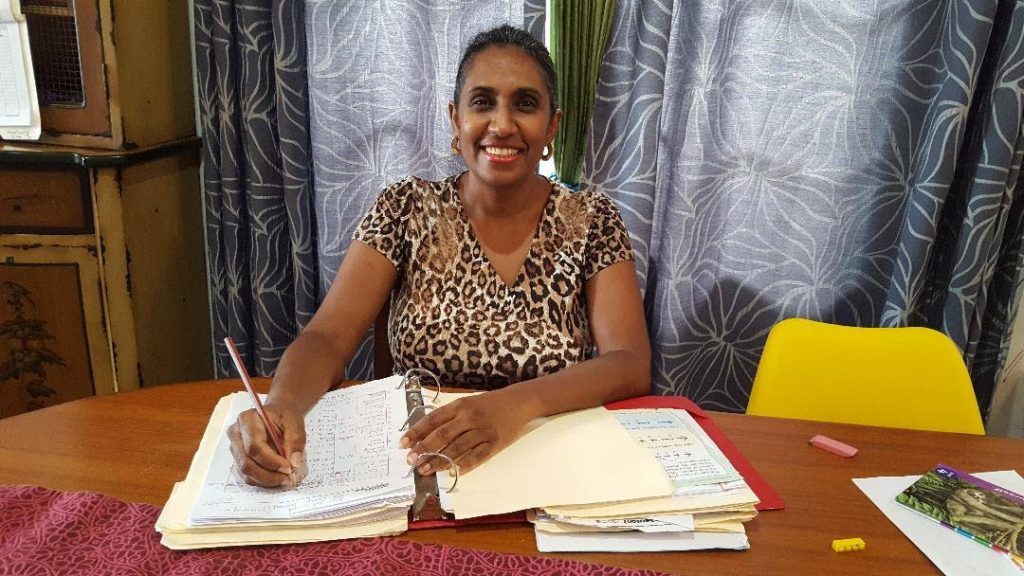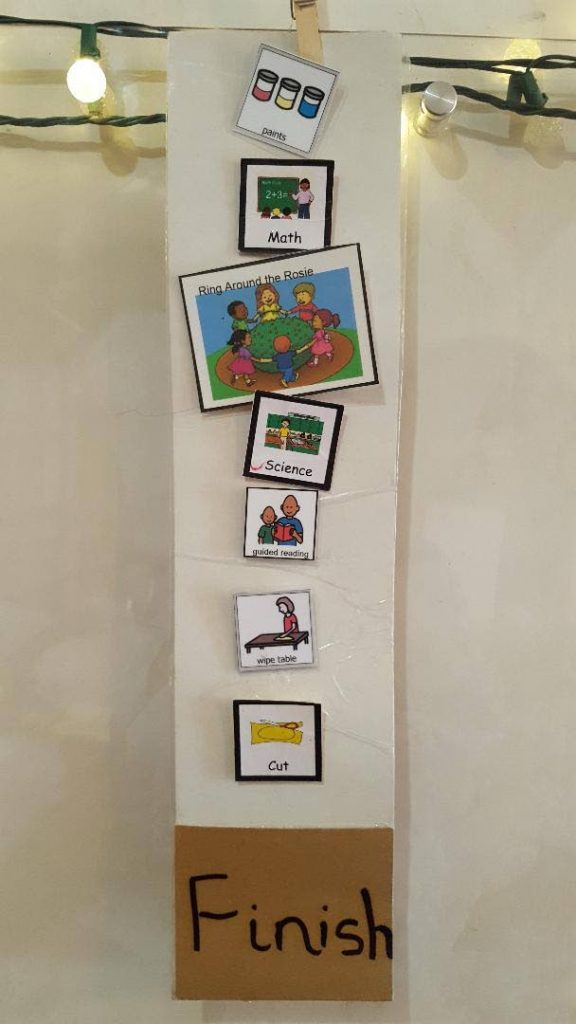Autism discrimination

Newsday today begins an examination of the education and services available to those with special needs which has been the subject of debate for several weeks with exchanges between parents, NGOs and the Education Ministry. Given current observances for Autism Awareness Month, we feature Autistic Society secretary Halena Kong Ting and her husband's challenges to get their autistic son into a school.
Children with special needs have been discriminated against in the public and private school systems – and even special needs schools have their faults and should have checks and balances put in place to regulate them.
These were just some observations of Halena Kong Ting, a mother of a child with autism, and secretary of the executive committee of the Autistic Society of TT (ASTT). She shared her family’s journey to home-schooling with Sunday Newsday.
Halena and her husband Kevin Kong Ting carried Zachary, now nine, to a speech therapist when he was three because he was not speaking. The therapist suggested they get him assessed and diagnosed because she believed Zachary was on the autism spectrum. However, the parents refused to believe it even after they researched the disorder and recognised some of the symptoms.
“We knew there was this possibility of him having autism but, like most parents, when we found out our child has a disability, we went into denial... Everybody was like, ‘Send him to school and he would start to talk. He’s just a late talker,’ so we did.”
They sent him to a private preparatory school but after a while, the school told them Zachary would not sit quietly and that they noticed signs of autism. They finally contacted ASTT which recommended a developmental paediatrician.
At three years and eight months they took him to be assessed. The developmental paediatrician tested Zachary and immediately told them he was on the autism spectrum, but of course, she, as well as speech and occupational therapists, had to perform a full assessment, which took about one year.
The paediatrician noted that Zachary was very high functioning and was capable of being in school system. “She recommended that we just send him, try to give him as much support as possible, make modifications, whatever he needs, and let’s see what happens,” said Halena.
After the initial diagnosis of autism, the parents took Zachary out of the pre-school as it was not equipped to deal with autistic students. And so the horrors of trying to get their son educated began.
Halena said she attempted to find a school that would accommodate the necessary changes to fit her son’s needs but she did not find any. “I kept calling around to private schools and now I’m using the term autism and from the time I said that word I got a no. At this time, ASTT was very supportive. I would teach him at home them carry him to ASTT. Every day they would work with him and teach him all the fundamentals that he should have been learning in a pre-school – letters, number, etc.”

She praised the ASTT for their support and assistance. She said the NGO had one-on-one was well as play group therapy to allow the children to learn social skills. However, although the NGO received a government subvention, it did not have speech or occupational therapy because it was too costly.
What it did have was a parenting group and one-on-one meetings to give advice and help parents deal with the challenges of having an autistic child. “When a parent comes, we talk with them, try to comfort them, and teach them what is autism. We focus on parent training because most of our members cannot afford therapy. So we run training courses for parents once a month and every few years we do certificates in autism education. It gave me the confidence to home-school Zachary.
“But it was a negative because I began to see what was needed in the schools I wanted to send him to and I began asking for it. And that’s when you stumble upon problems in Trinidad because from the time you demand what should be in place for a person with a disability, people start to get anxious and afraid.
“In the field of special needs, even though we have teachers coming out with degrees in special needs education and they work in these schools, unfortunately their model of education for special needs people is trying to teach them special skills, let them have fun, but not aiming for them to excel in academics or contribute to society. That’s what we want, for him to contribute.”
Take your son home!
Halena finally got Zachary into a government-assisted pre-school. How? Her mother went to the school and begged, and was told the only reason he was accepted was because the principal also had a special needs son.
She said the first year teacher was willing to take him and work with him so Halena acted as her son’s aid and provided all the support the teacher needed at her own expense. As an aid, Halena reminded Zachary to listen to the teacher when he lost focus. Also, sometimes he did not understand verbal instructions so she either had to re-word them, or write or draw for him to understand.
“He functions well in a class but he excelled when I became his aid. He went from being the last person to finish a worksheet, to being the first. When I saw that I realised I had to go with him every day.”

At that time, the couple also enrolled her second son, Rafael, now age seven, at the school. Halena explained that his speech was not as advanced as the other students because he had spent most of his time with his brother who did not speak. His teacher complained that, like any normal three-year-old, he would not sit still and suggested he too had autism, which, after an assessment, proved to be untrue.
Despite things going well for Zachary, the principal informed Halena the second year teacher refused to have an autistic child in her class, that Zachary could not learn to read in a “normal” way, and she should take both of her children and leave.
One day, near the end of the children’s first year, the principal barred them from entering the school compound. “I told her it was government-assisted school and she had no right to put my two kids out. She threatened me. She said, ‘If you send him (Zachary) we will not teach him and our school is near the road and you know kids with autism like to wander. We will not supervise him, we will not stop him, we will have nothing to do with him.’”
She said she wrote and delivered a letter to the Ministry of Education about the incident and returned to its offices for months after but got no response.
This left the frustrated parents with no choice. They placed Rafael in a “normal” pre-school and attempted to get Zachary into a primary school. “We decided to split them up because we realised he (Rafael) would forever be discriminated against if we chose to send them to the same school.”
She said every public school she called or visited refused to take Zachary on as a student because he had autism. One principal told her he could not be enrolled without an aid. She volunteered but was told they could not have a parent in the class with the teacher, and was advised to go to the ministry's Student Services Division to sign up to get an aid.
“I went there and the waiting list was real long. It was hundreds of names on this list. Well I just felt like giving up because it’s first come first served. I didn’t add my name because I am dealing with reality. I asked and there were only about 30 aids in the system at the time so I knew I would have had to wait for years to get one. At that point I realised children with special needs had no access to public education.”
Thousands of dollars to learn
Halena said she eventually got Zachary into a private, special needs primary school that would allow him to write the Secondary Entrance Assessment examination. She was told that, because he had autism, she would have to pay an extra $2,000.
She said she and Kevin paid even more for him to be placed in a regular class instead of a special class for more severe cases. Therefore, in total, they paid $9,000 a term. “And I didn’t really have this money. We had to scrape around to find it but because it’s our son, we did it.”
In addition, she provided visuals for the teacher to use with him, adapted his text books, and generally supported the teacher who did not have an aid in the class. “The plan was to go back to work. I was a secondary school teacher. But of course I couldn’t because I have to provide support, make all these visuals, help him with the homework. It was a lot of work but I did it.”
At one point she was asked to provide an electronic tablet for him. At some point, Halena realised the battery of the tablet was dead every afternoon. She then checked his textbooks and realised they had never been used. She believed the teachers were not doing any work with him, and were just letting him sit and watch his tablet.
She asked the teacher about it and tried to investigate but was told as a parent she could not be in the class during school hours. She therefore hired a speech and an occupational therapist to visit the school as they were allowed. They both told her there was no reason he could not learn or do the work but the teachers believed he could not because he did not speak. The therapists also told her they did not see the necessary support and equipment for the students of a special needs school.
Once again, Halena offered to provide even more support. She spoke to the teacher every day and was informed of the topic to be taught the next day. She would then make posters, cue cards and other visuals for the teachers to use, again at her own cost.
The next frustration was that the teacher told them Zachary could not write the end of term exam because it had to be modified. She requested that she modify it, which was allowed. The math exam however had to be delivered with blocks and other manipulatives along with the worksheet in a one-on-one setting. In the end, he got one of the highest marks for math in the class.
After that however, the principal refused to allow him to do the end of year exam. Halena offered to modify the exam again but was refused. “The principal is now discriminating against him in a special needs school. I asked why and all she could say was, 'no, no, no.' I felt that my child is writing every exam with modification, with help, and he is doing well. If you start to discriminate against him now there’s no chance you’ll let him write SEA so I took him out.”
After all those negative experiences, Halena was more cautious in where she would place her son. She called almost every private primary school in the west, east, and central but found only two that she would be willing to send him. Unfortunately but the fees were too exorbitant.
She said she learned if a child was severely autistic and needed a lot of support, no schools, not even special needs schools, would take the child. She said at the time, the one that would accept such a child, cost $15,000 a term.
At that time, Kevin suggested since she used to be a school teacher, did the beginners course with the ASTT, and was already making all the visuals for Zachary’s classes, why not teach him at home. And so she started to investigate home-schooling.
* Next week: Halena's teaches Zachary at home


Comments
"Autism discrimination"